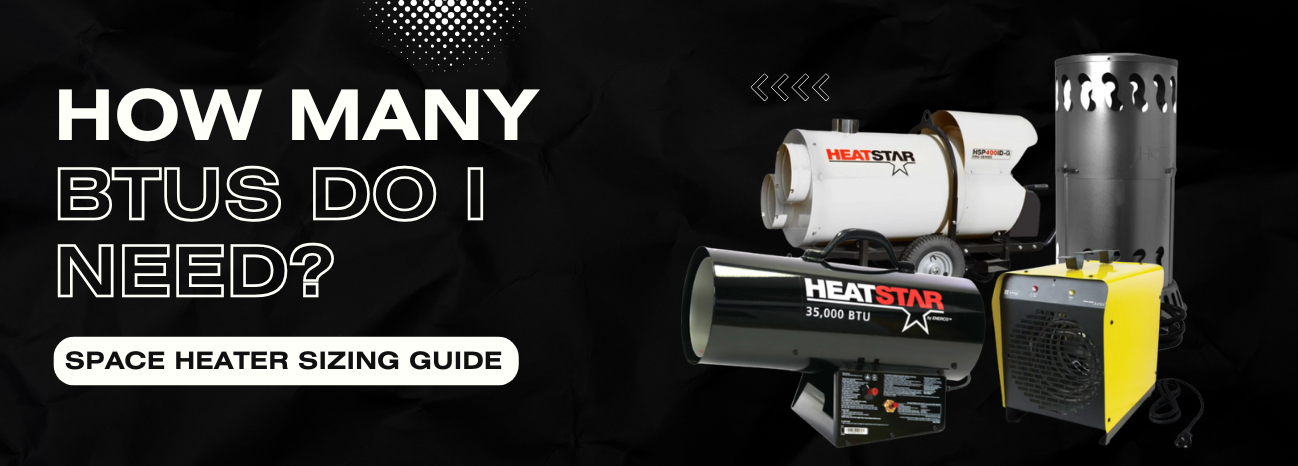Choosing the right heater size can make the difference between staying cozy and wasting energy. The key is understanding BTUs, British Thermal Units, and how they relate to your specific space.
This guide breaks down everything you need to know about sizing a space heater, including a simple BTU calculator and practical tips for making the right choice.
What Are BTUs and Why Do They Matter?
A British Thermal Unit (BTU) measures the amount of energy needed to raise one pound of water by 1°F. For heating, BTUs tell you how much heat a unit can produce per hour. More BTUs mean more heating power, but bigger isn't always better. You want just the right amount for your space.
Electric heaters are typically rated in watts, which you can convert to BTUs using this simple formula: 1 watt × 3.41 = BTUs. This conversion helps you compare different heater types and understand their true heating capacity.
Quick BTU Calculator: Room Size Chart
Use this heater sizing chart to find the right BTU output for your space:
| Room Size (sq ft) | Electric Heater (watts) | Gas Heater (BTUs) |
| 50 | 500 | 1,705 |
| 100 | 750 | 2,557 |
| 150 | 1,250 | 4,262 |
| 200 | 1,600 | 5,456 |
| 250 | 2,000 | 6,820 |
| 300 | 2,500 | 8,525 |
| 350 | 3,000 | 10,230 |
| 400 | 3,000 | 10,230 |
| 450 | 4,000 | 13,640 |
| 500 | 4,000 | 13,640 |

Easily find the right heater size with our free BTU Calculator—fast, accurate, and hassle-free results.
What Size Electric Heater Do I Need?
To determine the right space heater room size match, consider these key factors:
- Calculate your square footage: Measure the length × width of your room. A 12' × 15' room equals 180 square feet.
- Consider your climate: Northern regions need 30-40 BTUs per square foot, while southern areas typically require 20-30 BTUs per square foot.
- Account for ceiling height: The standard chart assumes 8-9-foot ceilings. Higher ceilings need more heating power.
-
Evaluate insulation: Well-insulated rooms retain heat better and need fewer BTUs. Poorly insulated spaces may need 50% more capacity.
Factors That Affect How Big a Space Heater You Need
Insulation Quality
-
Well-insulated spaces: Use the lower end of BTU recommendations
-
Average insulation: Follow standard BTU calculations
-
Poor insulation: Add 25-50% more BTUs to compensate for heat loss
Windows and Doors
Large windows, especially single-pane, increase heat loss significantly. Rooms with multiple windows or exterior doors typically need 10-20% more heating capacity.
Geographic Location
Your location plays a major role in sizing a space heater. Northern climates require more energy to maintain comfortable temperatures, while milder regions need less heating power.
Intended Use
-
Supplemental heating: Can use lower BTU ratings since your main heating system provides baseline warmth
-
Primary heating: Requires full BTU calculations for your space
-
Spot heating: Personal heaters for desks or small areas need minimal BTUs
Room Heater Size Calculator
Follow these steps for accurate space heater sizes:
- Measure your space: Length × width = square footage
- Determine temperature difference: How many degrees do you want to raise the room temperature?
- Assess insulation: Rate as excellent, good, average, or poor
-
Apply the formula: Square feet × BTU per square foot × insulation factor
Basic rule of thumb: Multiply your square footage by 10 for mild climates, 20 for moderate climates, or 30-40 for cold climates.
Common Space Heater Sizing Mistakes
Oversizing: A heater that's too powerful wastes energy and creates uncomfortable temperature swings. It may also cycle on and off frequently, reducing efficiency.
Undersizing: An inadequate heater runs constantly but never reaches your desired temperature, wasting energy and providing poor comfort.
Ignoring ceiling height: Standard calculations assume 8-foot ceilings. Rooms with vaulted or high ceilings need additional capacity.
Forgetting about airflow: Open floor plans or rooms connected to unheated spaces need extra heating power to compensate for air circulation.
👉 Save time and eliminate guesswork with our free BTU Calculator. Quickly find the perfect heater size for your space.
Energy Efficiency and Cost Considerations
Properly sizing a space heater saves money on energy bills. An appropriately sized unit runs at optimal efficiency, while oversized heaters waste electricity through frequent cycling.
Electric heaters are nearly 100% efficient at converting electricity to heat, but the cost depends on local electricity rates. Gas heaters often cost less to operate but require proper ventilation and professional installation.
Consider programmable thermostats or models with automatic shut-off features to maximize efficiency and safety.
Making the Right Choice for Your Space
Start with the BTU calculator above, then adjust based on your specific conditions. When in doubt, consult with a heating professional who can assess your unique situation.
Remember that proper placement matters too. Position your heater away from drafts and obstacles that could block airflow. This ensures you get the full benefit of your properly sized unit.
For CSA-certified heaters that meet Canadian safety standards and deliver reliable performance in demanding conditions, explore our selection of durable, efficient heating solutions designed for professionals who need dependable equipment that works when it matters most.
👉 Find the right heater size quickly with our free BTU Calculator. Get accurate results and save time on sizing.
